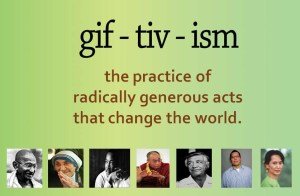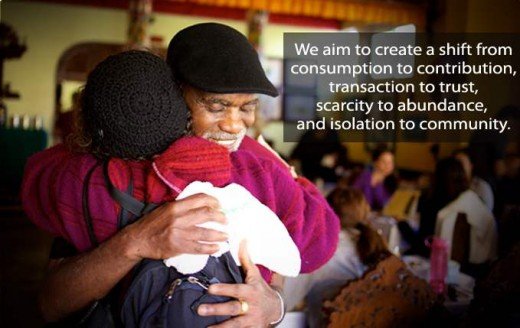Differentiating "idealized true gift" and "gift"
I was reading a book on the Gift Economy and I found these properties of Gifts which I would like to share with you all:
- Over time, giving and receiving must be in balance. (In ecological point of view, we need to insure that we will take no more from earth then we can give)
- The source of gift is to be acknowledged.
- Gifts circulate rather then accumulate.
- Gifts flow towards the greatest need.
Consider the ideal of free gift, which Jacques Derrida characterize as follows...
For there be a gift, there must be no reciprocity, return, exchange, counter gift, or debt.
Which means given does not get any benefits of social status, praise, expression of gratitude, and the feeling that one has done something virtuous. The closest example of this in personal life would be anonymous charity with religion.
The religious ideal of free gift that does not create social bond is, ironically, very similar to monetary transactions!
In monetary transaction also, if goods and services are paid, no obligation or social bond is created between the parties.
Idealized true gift and gift are very different.
Gift is...If you give me something, I feel grateful and will desire to give in return to you or to someone else in the community.
Whereas anonymous gifts doesn't create such obligation and doesn't strengthen the community.
In my idea of gift culture, the root of gift is very basic human nature of compassionate giving. When we see the need of another person, as a human, we want to extend ourselves to compassionately give, what is in our capacity, to met the need. And with the same principle if we will need something in future, the community will take care of my needs too. Either the same person will come forward to met my need or someone from the community will come forward. This process needs enormous amount of trust in the community. At the same time this liberate us from the notion that we have to return something now to the same person in the exact amount of what we have received. We can payback to anyone, anytime in any capacity. But we always want to give more in this type off culture because giving is our true nature.
A real life example could be, in a get together retreat, If I buy you a coffee, you don't need to buy me noodles of the exact amount. In fact you can choose to buy nothing to no one in the retreat. May be after a week you can just drop by other friend's house with some hand made cookies for his kid. And he will feel gratitude to you and circulate the cycle of gift by helping me in setting up my scooter when I need it.
This is the kind of communities I am trying to create in the world. Gift culture or Giftivism is the new edge economy we as a human needs to create in the world. I know that the more beautiful world my heart knows is possible. Will you help me create this beautiful world of compassionate giving and receiving?
One of the community I know in Jaipur is created by my friend @komal and Latika @footlooselatika. She has setup her home in a way that all of her friends can come and stay in her there without any monetary exchange. You will get free fruits, a place to sleep, lots of good chat all night and in return to this, she doesn't expect you to pay anything. But people who stayed in her house give her tons of gratitude and carries an obligation to pay it back to community. And I hope that when they see someone else in the community needs anything, this gratitude and obligation drives them to give from their heart.
-Inspired by the work of Charles Eisenstein.
For more information on the topic read Charles Eisenstein's book Sacred Economics: Money, Gift, and Society in the Age of Transition
Click to Read my previous blogs...
- Gift Economy: A system of social ties and obligation
- What is Gift Culture?
- Parvarish - Where community nurtures the baby
This is a space for discussing tough subjects: both personal experiences and the massive challenges in the wider world. The culture of this blog is one of looking for the possibility of forward movement through loving engagement, even, and especially, in times of disagreement. Please practice nonviolence in your comments by combining truth and courage with care for me and others you’re in dialogue with.

